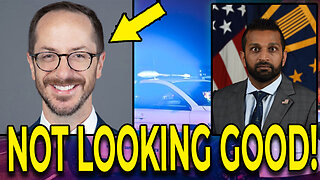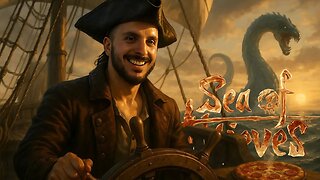Premium Only Content

Campbell: Hero Of Infinite Faces
Joseph Campbell (March 26, 1904- October 30, 1987) was an American professor, writer, and orator best known for his work in the fields of comparative mythology and comparative religion.
Campbell was born and raised in New York City in an upper middle class Roman Catholic family. As a child, Campbell became fascinated with Native American culture when his father took him to see the American Museum of Natural History in New York. He soon became versed in numerous aspects of Native American society, primarily in its mythology. This led to Campbell's lifelong passion with myth and its similar, seemingly cohesive threads among all human cultures. At Dartmouth College he studied biology and mathematics, but later transferred to Columbia University, where he received a Bachelor of Arts degree in 1925 and a Master of Arts degree in 1927.
Campbell is considered by some to be one of the most famous autodidacts, or 'self-educators', and is sometimes seen as a poster child for this way of learning. After completing his master's degree, Campbell decided not to go forward with his plans to earn a doctorate; instead, he went into the woods in upstate New York, reading deeply for five years. According to poet and author Robert Bly, a friend of Campbell, Campbell developed a systematic program of reading nine hours a day. According to Campbell, this is, in a sense, where his real education took place, and the time when he began to develop his unique view on the nature of life.
He went on to study Old French and Sanskrit at the University of Paris and the University of Munich. He learned to speak at least French, German, Japanese, and Sanskrit in addition to English. Campbell began his literary career by editing the posthumous papers of Indologist Heinrich Zimmer.
Campbell studied the ideas of the Swiss psychiatrist Carl Jung, who had been a colleague of Sigmund Freud. Campbell's work in mythology sought to bridge the seemingly disparate stances of Jung and Freud and their pivotal debate over the collective unconscious. Campbell also edited the first Eranos conference papers and helped to found Princeton's Bollingen Press. Another dissident member of Freud's circle who influenced Campbell was Wilhelm Stekel (1868 - 1939), who pioneered the application of Freud's conceptions of dreams, fantasies of the human mind, and the unconscious to such fields as anthropology and literature.
Campbell was a professor at Sarah Lawrence College from 1934 until 1972. He married his student, Jean Erdman, a dancer, in 1938. He died in 1987, in Honolulu.
Campbell relied on the texts of Jung as an explanation of psychological phenomena, as experienced through archetypes. But Campbell didn't agree with Carl Jung on every issue, and certainly had a very original voice of his own. Campbell didn't believe in astrology or synchronicity as Jung had. Campbell's true study and interpretation is in the melding of accepted ideas and symbolism. His iconoclastic approach was as original as it was radical. His take on religion has been compared to Einstein's idea of science in his last days, the search is for a unifying theory.
"Truth is one, the sages speak of it by many names," he often quoted from the Vedas. Joseph Campbell was fascinated by what he viewed as universal sentiments and truths, disseminated through cultures which all featured different manifestations. He wanted to show his idea that Eastern and Western religions are the same on a very basic level, and that nobody is right but everyone is searching for the same unknown, and indeed unknowable, answer. He began to look paradoxically at moral systems as both incorrect and necessary. Like the postmodern relativists he believed such things as 'right' and 'wrong' are just contrived ideas, but also like them he understood a moral system is necessary from the perspective of a student of mythology and psychology. In this way he melded also the concepts of modernism and postmodernism, although some interpretations place him as a postmodernist before his time.
Heroes played a crucial role in his comparative studies. In 1949 The Hero With a Thousand Faces set out the idea of the monomyth, a streamlined version of all the archetypal patterns Campbell recognized (Campbell's archivist at the Pacifica Graduate Institute says he borrowed the term from James Joyce's novel Finnegans Wake). The monomyth involves the hero receiving a "call to adventure"; to leave the ordinary world which he has psychologically or spiritually outgrown. After passing "threshold guardians" (often with the aid of a wise mentor or spirit guide) the hero enters a dreamlike world, generally a dark forest, a desert, an underworld or a mysterious island. After a series of trials in which the hero eventually surpasses his mentor, the hero achieves the object of his quest.
Campbell said James Joyce and Thomas Mann were his gurus.
-
 1:00
1:00
Literati
1 year agoAwakening
88 -
 14:23
14:23
T-SPLY
1 day agoNashville Mayor Is Getting Closer To Being Arrested For ICE Obstructions
46.5K49 -
 LIVE
LIVE
MadHouseRetro
3 hours agoMadhouse Presents : Triple Warbricks Model build! Sponsored by Warbricks USA!!!!
64 watching -
 3:39:49
3:39:49
TheItalianCEO
4 hours agoRumble is for pirates - Sea of Thieves top 250 in the world
27.3K1 -
 10:29
10:29
Mrgunsngear
2 days ago $8.69 earnedOtter Creek OCM5: The Quietest MK12 Silencer To Date 🇺🇸
63.3K21 -
 40:30
40:30
Kitco NEWS
1 day ago2030 Commodity Surge: What to Buy Before Prices Explode | Adam Rozencwajg
23.2K2 -
 4:13:02
4:13:02
EXPBLESS
6 hours agoBig Robots Shooting Eachother Seems Pretty Fun - Steel Hunter's LIVE
21.3K2 -
 25:29
25:29
The Dr. Ardis Show
2 days ago $4.68 earnedThe Dr. Ardis Show | Economic Update with Kirk Elliot | Episode 05.30.2025
21.2K3 -
 10:27
10:27
Professor Gerdes Explains 🇺🇦
1 day agoEx CIA Director: This Nation is Putin's NEXT Target Urgent Warning
17K22 -
 3:50:32
3:50:32
Biscotti-B23
5 hours ago $0.42 earned🔴 LIVE SURPRISE BETA 🏆 CUSTOM MATCHES & ELITE RANK GRIND ⚽ REMATCH
13.4K